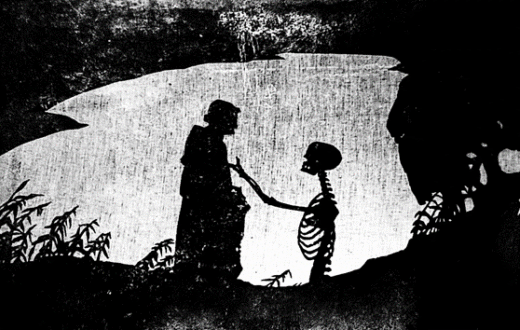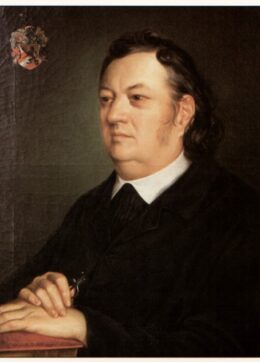
Printed
20 pages
Author(s)
Der Totengräber von Feldberg
Justinus Kerner’s taste and writings were shaped by Des Knaben Wunderhorn (The Boy’s Magic Horn) – a collection of traditional songs published by Achim von Arnim and Clemens Bretano – and by his friendship with Ludwig Uhland, a poet and ardent supporter of folk poetry. During a training trip in Hamburg and Vienna in 1808-1809, at the end of which he published his poetic and autobiographical travelogue Reiseschatten (Travelling shadows, 1811), Justinus Kerner attended puppet shows and wrote “Chinese shadow puppetry” plays. His correspondence with Ludwig Uhland reveals original thoughts about shadow theatre; as it is suited to show imaginative images and a world less bound by the limiting laws of physics, they saw shadow puppetry as an alluring alternative to realistic representations.
Der Totengräber von Feldberg (The Gravedigger of Feldberg) was placed at the end of the second chapter of Reiseschatten, when the narrator goes to the inn of a small town and attends the performance of a troupe of actors; despite the intense disapproval of a learnt audience, they put on a play different from that initially programmed—it is entitled “Der Totengräber von Feldberg”.
Premiered in 1907, in the winter of the very first season of the Schwabinger Schattenspiele in Munich, this play was particularly meaningful to Alexander von Bernus, the main founder and architect of the shadow theatre of Schwabing. In the memoirs of his youth, Wachsen am Wunder (Growing from the Miracle, 1973), he writes that he read this text when he was in high school; he was captivated by it and by the new genre he had just discovered. His artistic ambitions with the Schwabinger Schattenspiele would indeed form in the wake of the Swabian romantics Ludwig Uhland and Justinus Kerner.
A man makes a deal with the devil to fly
Spring is cheering the birds and people up: a child is amazed to see a butterfly take flight, young boys are playing with a kite, and the gravedigger, envious, admires a heron in the sky. His neighbour, a blacksmith, tells him that his wings are ready. He tries in vain to talk him out of his dream of flying. Elsbeth despairs at her husband’s fixation and relates the gravedigger’s dream; the latter is particularly gloomy and worries Elsbeth. Meanwhile, the gardener, who is in love with Elsbeth, easily removes his naïve rival, the poet Blumenstengel (literally, Flower stem) : the latter believes that he has temporarily been transformed into an attractive sunflower. At night, the gravedigger tries over and over to take flight; he invokes the moon and stars before yielding to the devil’s proposal… A few days later, the gardener and the young Elsbeth bill and coo as they praise the flowers of springs; then, devastated, the gravedigger’s wife relates that her husband, who has been missing for some time, appeared to her during the night and ordered her to die after one final and icy kiss. Two graves were dug. At night, the gravedigger calls Death, who takes a long time to come. When the clock strikes midnight, he hurries inside his house with a knife. The following day, it is revealed that he has killed his wife and daughter; he is denounced and sentenced to hang. The gardener mourns Elsbeth and the crowd laments the gravedigger’s madness.
First performance
Schwabinger Schattenspiele
Publications and translations
Justinus Kerner, Reiseschatten: von dem Schattenspieler Luchs, Heidelberg, Braun, 1811
